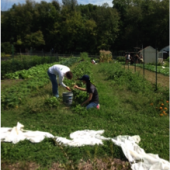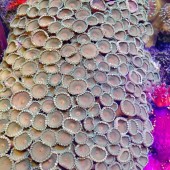
Abstract: Campus agriculture projects are increasingly being recognized as spaces impactful to student engagement and learning through curricular and co-curricular programming; however, most campus farm activities are limited to agriculture or sustainability programs and/or co-curricular student clubs. Thus, campus farms are largely underutilized in the undergraduate curriculum, marking a need to explore the efficacy and impact of engaging a diverse array of disciplinary courses in the rich social, environmental, and civic context of local sustainable agriculture. The Farm Hub program presented here incentivizes instructors to refocus a portion of existing course content around the topic of local, sustainable agriculture, and reduces barriers to using a campus farm as a situated learning context for curricula. A pedagogical framework founded in place-based experiential learning (PBEL) theory was developed to guide instructors in the development and implementation of 4–6-week inquiry-based PBEL modules embedded in existing courses. The framework was converted into a research protocol to quantify program implementation fidelity and PBEL best practice adherence for the proposed lesson plans (intended) and their implementation (applied). The framework enables the development of a cohesive cross-curricular program so that the impact of implementation fidelity and best practice adherence to student learning outcomes in scientific literacy, place attachment and meaning, and civic mindedness can be assessed and the results utilized to develop a formal farm-situated PBEL pedagogical taxonomy. This framework can be applied to PBEL curriculum in natural spaces beyond campus farms.
Continue Reading
Undergraduate energy education is often offered from a specific perspective, such as engineering, sustainability, policy, or economics. This essay argues that undergraduate programs in energy should be explicitly interdisciplinary, because issues surrounding energy production, transmission, and use have multiple perspectives. Challenges to creating interdisciplinary energy programs include often-compartmentalized nature of colleges and universities, and employment prospects for broadly-educated graduates that may not be clear. Strategies for overcoming those issues are proposed, but others remain to be developed by leaders in undergraduate energy education.
Continue Reading
This report describes a unique technique for presenting an introduction to sustainability science course that is both required for sustainability science majors at a large Mid-Atlantic state university and a general education non-laboratory science course. The World Scientists’ Warning to Humanity, released by the Union of Concerned Scientists in the late 1990s, serves and an indictment of humanity. The course mimics a trial as it proceeds from the indictment through an arraignment, pre-trial, trial, verdict, and sentencing with students acting both as the accused and the jury.
Continue ReadingThe purpose of this study was to determine systems thinking skill development among undergraduate students and assess the effectiveness of two different instructional methods for increasing these skills. Undergraduate students from two four-year state institutions, one located in the Midwestern region (n=20) of the United States and one in the Southwestern region (n=16) participated in the study. To accomplish the research object, the study employed a mixed between-within subjects experiment. Employing two different systems thinking teaching interventions, one group of students was exposed to a one-time intervention while the other group was exposed to a more extended and holistic intervention. Data were collected at two points in time: pre- and post-intervention. At the beginning (pre-intervention) and end (post-intervention) of one semester, students read case studies describing apparel firms’ sustainability efforts. The students were then tasked to identify sustainability challenges, analyze conflicts between challenges, and offer business recommendations. Using a rubric, the authors scored the students’ responses on a scale of 0 to 5 and assessed ability to 1) think holistically and 2) perceive interrelationships and resolve resulting conflicts. T-tests revealed that prior to the teaching interventions, as a whole, the students had unsophisticated skills related to their ability to think in systems. ANOVA revealed that, through instructional methods focused on systems thinking, it is possible to increase students’ ability to think in systems. Additionally, the study revealed that, compared to a constrained one-time intervention, a long-term, holistic, and integrated approach is significantly more effective in encouraging students’ system thinking competencies. Results of this study support the need for educators to integrate teaching methods designed to increase students’ systems thinking competencies holistically throughout course curriculum. Additionally, the study outlines a transferrable approach to assessing systems thinking skills within postsecondary education.
Continue Reading